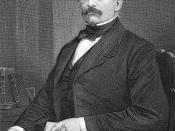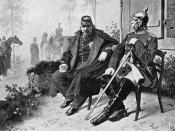The failure of German liberalism can be attributed in part Austrian Prince Klemens von Metternich and German chancellor Otto von Bismarck. In the years following the French Revolution the monarchies of Europe tried to promoted conservative views in order to justify their rule. Metternich foresaw the spread of liberalism from the American and French revolution as a giant threat. With the Carlsbad Decrees issued in 1819, he sought to repress the spread of liberal ideas by heavily regulating and censoring newspapers throughout Austria and the German states. In this document he also set guidelines for heavy punishments to both the students and professors of universities for participation in the distribution of liberal ideology. This early oppression against German liberal thinking would help pave the way for Bismarck to take advantage of the liberal population.
Bismarck, who himself represented the aristocracy, used liberal support to unify the German states under the Prussian King William I.
He believed that the German middle class could eventually be persuaded to accept national unity ruled conservative leadership. He managed to appease and gain liberal support by drafting a federal constitution and creating a legislature containing two houses, the lower of which was elected by universal male suffrage. Even with the new divisions of power within this new government the King and Chancellor Bismarck continued to have supreme authority. Bismarck had succeeded in unifying most of the northern German states and when the Franco-Prussian war begins he gained the support of the southern German states. The National Liberals supported Bismarck and his legislation for the economic and legal unification of their country. They also supported him in a legal crusade against the Catholic Church who wanted Germans to put their loyalty to the church before their nation. Once again Bismarck was manipulating national feelings for...



Good paper
It's kind of short but it goes far back into the carlsbad decrees which I think came a little while before bismarck. Not bad, not bad at all.
2 out of 2 people found this comment useful.